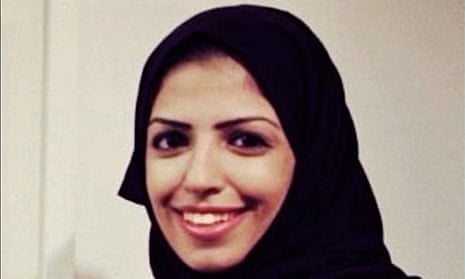Salma al-Shehab, the Saudi PhD student who was sentenced to 34 years in prison for using Twitter, told a Saudi court that she had faced abuse and harassment during her detention, including being subjected to interrogations after being given medications that exhausted her.
The 34-year-old, who was completing her PhD at Leeds University before her January 2021 arrest during a holiday at home, also alleged that she had been “repeatedly accosted” by at least five men for being a member of the kingdom’s Shia Muslim minority. Without providing more details, Shehab said the actions had led to an “outright insult and abuse of human dignity”.
A translation of Shehab’s statement to the court, which was delivered during her first trial, was provided to the Guardian by The Freedom Initiative, a nonprofit based in the US that advocates for wrongfully detained prisoners in the Middle East and north Africa. It is not clear when precisely the statement was made.
The statement includes several allegations of rights violations under Saudi law, and suggests Shehab may have faced physical or sexual violence, but does not make any explicit allegations of that nature. She cited violations of Saudi law that prevent “emotional or mental harming” and subjection to torture and inhumane treatment.
In the statement, Shehab alleges that she was not given access to a lawyer after her initial arrest in January 2021 and was illegally held for 285 days before being referred to a court. Under Saudi rules, she should have been released after 180 days.
Other new details of Shehab’s treatment include the allegation that she was held in solitary confinement for 13 days and was denied visits and phone calls from her family. An interrogator also threatened her with the “cancellation” of her studies.
At one point, Shehab said an investigator wanted to include in her statement that Shehab was a member of the Muslim Brotherhood, a transnational Sunni Islamist movement that is considered a terrorist organisation in several Arab states including Saudi Arabia.
“How can the investigator allow himself the opportunity to add in his own personal opinions?” she wrote.
Shehab also invited the court to look into the “manner of investigation” used against her, which had included “corrupt practices” that led to “statements contrary to the free will of detainees, which is legally guaranteed”.
Shehab’s case has gained international attention as a result of the draconian sentence, which includes a 34-year travel ban after her 34-year prison sentence. The special terrorist court where she was tried alleged that Shehab had supported terrorist ideology because of her use of Twitter, including the fact that she followed the accounts of some dissidents.
Twitter has declined to comment on the case. Saudi Arabia is a significant indirect investor in the company and Saudi billionaire Prince Alwaleed bin Talal, who has expressed allegiance to Saudi crown prince Mohammed bin Salman, owns 5% of the company’s stock.
US state department spokesperson Ned Price this week said the Biden administration was “studying the case” and the sentence.
“I can say as a general matter, exercising the freedom of expression and advocating for the rights of women should never be criminalised,” he said. He said that the US government does raise “specific cases” that come to the administration’s attention when they “run afoul of rights that should be universal” but did not specifically state whether the administration was advocating for Shehab.
In her statement to the court, Shehab vigorously denied that her following of certain accounts on Twitter meant that she was sympathetic to their cause or in agreement with the individuals. She denied the charge that following individuals on Twitter was akin to giving the individuals “aid” and said she did not espouse any violent or terrorist ideology.
“Following them may be out of curiosity or to see what they say, or to protect ourselves from their deception by becoming familiar with it. This does not imply support,” she said.
She added: “I deplore all forms of extremism, violence, terrorism, and racism. This is evident in my posts and further evident in that I use my real name and put up pictures of my kids.” Having an account with about 2,000 followers meant she could not have the impact alleged by the court.
Shehab was initially sentenced to six years in prison, and told she had to serve three. Later, after an appeal and new charges by the public prosecutor, the sentence was increased to 34 years.
